- Home
- H. P. Lovecraft
Necronomicon Page 3
Necronomicon Read online
Page 3
The removal of the slab revealed a black aperture, from which rushed an effluence of miasmal gases so nauseous that we started back in horror. After an interval, however, we approached the pit again, and found the exhalations less unbearable. Our lanterns disclosed the top of a flight of stone steps, dripping with some detestable ichor of the inner earth, and bordered by moist walls encrusted with nitre. And now, for the first time my memory records verbal discourse, Warren addressing me at length in his mellow tenor voice; a voice singularly unperturbed by our awesome surroundings.
‘I’m sorry to have to ask you to stay on the surface,’ he said, ‘but it would be a crime to let anyone with your frail nerves go down there. You can’t imagine, even from what you have read and from what I’ve told you, the things I shall have to see and do. It’s fiendish work, Carter, and I doubt if any man without ironclad sensibilities could ever see it through and come up alive and sane. I don’t wish to offend you, and Heaven knows I’d be glad enough to have you with me; but the responsibility is in a certain sense mine, and I couldn’t drag a bundle of nerves like you down to probable death or madness. I tell you, you can’t imagine what the thing is really like! But I promise to keep you informed over the telephone of every move - you see I’ve enough wire here to reach to the centre of the earth and back!’
I can still hear, in memory, those coolly spoken words; and I can still remember my remonstrances. I seemed desperately anxious to accompany my friend into those sepulchral depths, yet he proved inflexibly obdurate. At one time he threatened to abandon the expedition if I remained insistent; a threat which proved effective, since he alone held the key to the thing. All this I can still remember, though I no longer know what manner of thing we sought. After he had obtained my reluctant acquiescence in his design, Warren picked up the reel of wire and adjusted the instruments. At his nod I took one of the latter and seated myself upon an aged, discoloured gravestone close by the newly uncovered aperture. Then he shook my hand, shouldered the coil of wire, and disappeared within that indescribable ossuary.
For a minute I kept sight of the glow of his lantern, and heard the rustle of the wire as he laid it down after him; but the glow soon disappeared abruptly, as if a turn in the stone staircase had been encountered, and the sound died away almost as quickly. I was alone, yet bound to the unknown depths by those magic strands whose insulated surface lay green beneath the struggling beams of that waning crescent moon.
I constantly consulted my watch by the light of my electric lantern, and listened with feverish anxiety at the receiver of the telephone; but for more than a quarter of an hour heard nothing. Then a faint clicking came from the instrument, and I called down to my friend in a tense voice. Apprehensive as I was, I was nevertheless unprepared for the words which came up from that uncanny vault in accents more alarmed and quivering than any I had heard before from Harley Warren. He who had so calmly left me a little while previously, now called from below in a shaky whisper more portentous than the loudest shriek:
‘God! If you could see what I am seeing!’
I could not answer. Speechless, I could only wait. Then came the frenzied tones again:
‘Carter, it’s terrible - monstrous - unbelievable!’
This time my voice did not fail me, and I poured into the transmitter a flood of excited questions. Terrified, I continued to repeat, ‘Warren, what is it? What is it?’
Once more came the voice of my friend, still hoarse with fear, and now apparently tinged with despair:
‘I can’t tell you, Carter! It’s too utterly beyond thought - I dare not tell you - no man could know it and live - Great God! I never dreamed of this!’
Stillness again, save for my now incoherent torrent of shuddering inquiry. Then the voice of Warren in a pitch of wilder consternation:
‘Carter! For the love of God, put back the slab and get out of this if you can! Quick! - leave everything else and make for the outside - it’s your only chance! Do as I say, and don’t ask me to explain!’
I heard, yet was able only to repeat my frantic questions. Around me were the tombs and the darkness and the shadows; below me, some peril beyond the radius of the human imagination. But my friend was in greater danger than I, and through my fear I felt a vague resentment that he should deem me capable of deserting him under such circumstances. More clicking, and after a pause a piteous cry from Warren:
‘Beat it! For God’s sake, put back the slab and beat it, Carter!’
Something in the boyish slang of my evidently stricken companion unleashed my faculties. I formed and shouted a resolution, ‘Warren, brace up! I’m coming down!’ But at this offer the tone of my auditor changed to a scream of utter despair:
‘Don’t! You can’t understand! It’s too late - and my own fault. Put back the slab and run - there’s nothing else you or anyone can do now!’
The tone changed again, this time acquiring a softer quality, as of hopeless resignation. Yet it remained tense through anxiety for me. ‘Quick - before it’s too late!’
I tried not to heed him; tried to break through the paralysis which held me, and to fulfil my vow to rush down to his aid. But his next whisper found me still held inert in the chains of stark horror.
‘Carter - hurry! It’s no use - you must go - better one than two - the slab—’
A pause, more clicking, then the faint voice of Warren:
‘Nearly over now - don’t make it harder - cover up those damned steps and run for your life - you’re losing time - so long, Carter - won’t see you again.’
Here Warren’s whisper swelled into a cry; a cry that gradually rose to a shriek fraught with all the horror of the ages—
‘Curse these hellish things - legions - My God! Beat it! Beat it! BEAT IT!’
After that was silence. I know not how many interminable eons I sat stupefied; whispering, muttering, calling, screaming into that telephone. Over and over again through those eons I whispered and muttered, called, shouted, and screamed, ‘Warren! Warren! Answer me - are you there?’
And then there came to me the crowning horror of all - the unbelievable, unthinkable, almost unmentionable thing. I have said that eons seemed to elapse after Warren shrieked forth his last despairing warning, and that only my own cries now broke the hideous silence. But after a while there was a further clicking in the receiver, and I strained my ears to listen. Again I called down, ‘Warren, are you there?’ and in answer heard the thing which has brought this cloud over my mind. I do not try, gentlemen, to account for that thing - that voice - nor can I venture to describe it in detail, since the first words took away my consciousness and created a mental blank which reaches to the time of my awakening in the hospital. Shall I say that the voice was deep; hollow; gelatinous; remote; unearthly; inhuman; disembodied? What shall I say? It was the end of my experience, and is the end of my story. I heard it, and knew no more - heard it as I sat petrified in that unknown cemetery in the hollow, amidst the crumbling stones and the falling tombs, the rank vegetation and the miasmal vapours - heard it well up from the innermost depths of that damnable open sepulchre as I watched amorphous necrophagous shadows dance beneath an accursed waning moon.
And this is what it said:
‘You fool, Warren is DEAD!’
THE DOOM THAT CAME TO SARNATH
THERE IS IN THE land of Mnar a vast still lake that is fed by no stream, and out of which no stream flows. Ten thousand years ago there stood by its shore the mighty city of Sarnath, but Sarnath stands there no more.
It is told that in the immemorial years when the world was young, before ever the men of Sarnath came to the land of Mnar, another city stood beside the lake; the grey stone city of Ib, which was old as the lake itself, and peopled with beings not pleasing to behold. Very odd and ugly were these beings, as indeed are most beings of a world yet inchoate and rudely fashioned. It is written on the brick cylinders of Kadatheron that the beings of Ib were in hue as green as the lake and the mists that rise above it; that they
had bulging eyes, pouting, flabby lips, and curious ears, and were without voice. It is also written that they descended one night from the moon in a mist; they and the vast still lake and grey stone city of Ib. However this may be, it is certain that they worshipped a sea-green stone idol chiselled in the likeness of Bokrug, the great water-lizard; before which they danced horribly when the moon was gibbous. And it is written in the papyrus of Ilarnek, that they one day discovered fire, and thereafter kindled flames on many ceremonial occasions. But not much is written of these beings, because they lived in very ancient times, and man is young, and knows but little of the very ancient living things.
After many eons men came to the land of Mnar, dark shepherd folk with their fleecy flocks, who built Thraa, Ilarnek, and Kadatheron on the winding river Ai. And certain tribes, more hardy than the rest, pushed on to the border of the lake and built Sarnath at a spot where precious metals were found in the earth.
Not far from the grey city of Ib did the wandering tribes lay the first stones of Sarnath, and at the beings of Ib they marvelled greatly. But with their marvelling was mixed hate, for they thought it not meet that beings of such aspect should walk about the world of men at dusk. Nor did they like the strange sculptures upon the grey monoliths of Ib, for those sculptures lingered so late in the world, even until the coming men none can tell; unless it was because the land of Mnar is very still, and remote from most other lands, both of waking and of dream.
As the, men of Sarnath beheld more of the beings of Ib their hate grew, and it was not less because they found the beings weak, and soft as jelly to the touch of stones and arrows. So one day the young warriors, the slingers and the spearmen and the bowmen, marched against Ib and slew all the inhabitants thereof, pushing the queer bodies into the lake with long spears, because they did not wish to touch them. And because they did not like the grey sculptured monoliths of Ib they cast these also into the lake; wondering from the greatness of the labour how ever the stones were brought from afar, as they must have been, since there is naught like them in the land of Mnar or in the lands adjacent.
Thus of the very ancient city of Ib was nothing spared, save the sea-green stone idol chiselled in the likeness of Bokrug, the water-lizard. This the young warriors took back with them as a symbol of conquest over the old gods and beings of Ib, and as a sign of leadership in Mnar. But on the night after it was set up in the temple, a terrible thing must have happened, for weird lights were seen over the lake, and in the morning the people found the idol gone and the high-priest Taran-Ish lying dead, as from some fear unspeakable. And before he died, Taran-Ish had scrawled upon the altar of chrysolite with coarse shaky strokes the sign of DOOM.
After Taran-Ish there were many high-priests in Sarnath, but never was the sea-green stone idol found. And many centuries came and went, wherein Sarnath prospered exceedingly, so that only priests and old women remembered what Taran-Ish had scrawled upon the altar of chrysolite. Betwixt Sarnath and the city of Ilarnek arose a caravan route, and the precious metals from the earth were exchanged for other metals and rare cloths and jewels and books and tools for artificers and all things of luxury that are known to the people who dwell along the winding river Ai and beyond. So Sarnath waxed mighty and learned and beautiful, and sent forth conquering armies to subdue the neighbouring cities; and in time there sate upon a throne in Sarnath the kings of all the land of Mnar and of many lands adjacent.
The wonder of the world and the pride of all mankind was Sarnath the magnificent. Of polished desert-quarried marble were its walls, in height three hundred cubits and in breadth seventy-five, so that chariots might pass each other as men drove them along the top. For full five hundred stadia did they run, being open only on the side toward the lake where a green stone sea-wall kept back the waves that rose oddly once a year at the festival of the destroying of Ib. In Sarnath were fifty streets from the lake to the gates of the caravans, and fifty more intersecting them. With onyx were they paved, save those whereon the horses and camels and elephants trod, which were paved with granite. And the gates of Sarnath were as many as the landward ends of the streets, each of bronze, and flanked by the figures of lions and elephants carven from some stone no longer known among men. The houses of Sarnath were of glazed brick and chalcedony, each having its walled garden and crystal lakelet. With strange art were they builded, for no other city had houses like them; and travellers from Thraa and Ilarnek and Kadatheron marvelled at the shining domes where with they were surmounted.
But more marvellous still were the palaces and the temples, and the gardens made by Zokkar the olden king. There were many palaces, the last of which were mightier than any in Thraa or Ilarnek or Kadatheron. So high were they that one within might sometimes fancy himself beneath only the sky; yet when lighted with torches dipt in the oil of Dother their walls showed vast paintings of kings and armies, of a splendour at once inspiring and stupefying to the beholder. Many were the pillars of the palaces, all of tinted marble, and carven into designs of surpassing beauty. And in most of the palaces the floors were mosaics of beryl and lapis lazuli and sardonyx and carbuncle and other choice materials, so disposed that the beholder might fancy himself walking over beds of the rarest flowers. And there were likewise fountains, which cast scented waters about in pleasing jets arranged with cunning art. Outshining all others was the palace of the kings of Mnar and of the lands adjacent. On a pair of golden crouching lions rested the throne, many steps above the gleaming floor. And it was wrought of one piece of ivory, though no man lives who knows whence so vast a piece could have come. In that palace, there were also many galleries, and many amphitheatres where lions and men and elephants battled at the pleasure of the kings. Sometimes the amphitheatres were flooded with water conveyed from the lake in mighty aqueducts, and then were enacted stirring sea-fights, or combats betwixt swimmers and deadly marine things.
Lofty and amazing were the seventeen tower-like temples of Sarnath, fashioned of a bright multi-coloured stone not known elsewhere. A full thousand cubits high stood the greatest among them, wherein the high-priests dwelt with a magnificence scarce less than that of the kings. On the ground were halls as vast and splendid as those of the palaces; where gathered throngs in worship of Zo-Kalar and Tamash and Lobon, the chief gods of Sarnath, whose incense-enveloped shrines were as the thrones of monarchs. Not like the eikons of other gods were those of Zo-Kalar and Tamash and Lobon. For so close to life were they that one might swear the graceful bearded gods themselves sate on the ivory thrones. And up unending steps of zircon was the tower-chamber, wherefrom the high-priests looked out over the city and the plains and the lake by day; and at the cryptic moon and significant stars and planets, and their reflections in the lake, at night. Here was done the very secret and ancient rite in detestation of Bokrug, the water-lizard, and here rested the altar of chrysolite which bore the Doom-scrawl of Taran-Ish.
Wonderful likewise were the gardens made by Zokkar the olden king. In the centre of Sarnath they lay, covering a great space and encircled by a high wall. And they were surmounted by a mighty dome of glass, through which shone the sun and moon and planets when it was clear, and from which were hung fulgent images of the sun and moon and stars and planets when it was not clear. In summer the gardens were cooled with fresh odorous breezes skilfully wafted by fans, and in winter they were heated with concealed fires, so that in those gardens it was always spring. There ran little streams over bright pebbles, dividing meads of green and gardens of many hues, and spanned by a multitude of bridges. Many were the waterfalls in their courses, and many were the lilied lakelets into which they expanded. Over the streams and lakelets rode white swans, whilst the music of rare birds chimed in with the melody of the waters. In ordered terraces rose the green banks, adorned here and there with bowers of vines and sweet blossoms, and seats and benches of marble and porphyry. And there were many small shrines and temples where one might rest or pray to small gods.
Each year there was celebrated in Sarnath t
he feast of the destroying of Ib, at which time wine, song, dancing and merriment of every kind abounded. Great honours were then paid to the shades of those who had annihilated the odd ancient beings, and the memory of those beings and of their elder gods was derided by dancers and lutanists crowned with roses from the gardens of Zokkar. And the kings would look out over the lake and curse the bones of the dead that lay beneath it.
At first the high-priests liked not these festivals, for there had descended amongst them queer tales of how the sea-green eikon had vanished, and how Taran-Ish had died from fear and left a warning. And they said that from their high tower they sometimes saw lights beneath the waters of the lake. But as many years passed without calamity even the priests laughed and cursed and joined in the orgies of the feasters. Indeed, had they not themselves, in their high tower, often performed the very ancient and secret rite in detestation of Bokrug the water-lizard? And a thousand years of riches and delight passed over Sarnath, wonder of the world.

 The Best of H.P. Lovecraft
The Best of H.P. Lovecraft The Definitive H.P. Lovecraft: 67 Tales Of Horror In One Volume
The Definitive H.P. Lovecraft: 67 Tales Of Horror In One Volume The Complete Works of H.P. Lovecraft
The Complete Works of H.P. Lovecraft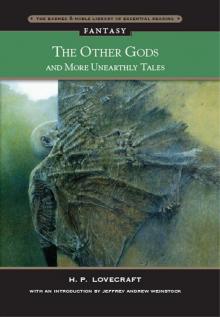 Other Gods and More Unearthly Tales
Other Gods and More Unearthly Tales Lovecraft's Fiction Volume I, 1905-1925
Lovecraft's Fiction Volume I, 1905-1925 The Shadow Out of Time
The Shadow Out of Time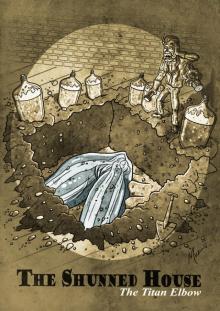 The Shunned House
The Shunned House Lovecraft's Fiction Volume II, 1926-1928
Lovecraft's Fiction Volume II, 1926-1928 The Thing on the Doorstep and Other Weird Stories
The Thing on the Doorstep and Other Weird Stories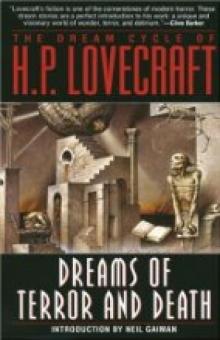 Dream Cycle of H. P. Lovecraft: Dreams of Terror and Death
Dream Cycle of H. P. Lovecraft: Dreams of Terror and Death Great Tales of Horror
Great Tales of Horror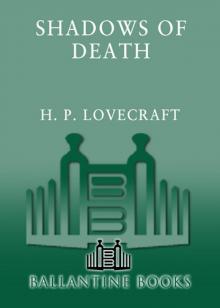 Shadows of Death
Shadows of Death Delphi Complete Works of H. P. Lovecraft (Illustrated)
Delphi Complete Works of H. P. Lovecraft (Illustrated) Waking Up Screaming: Haunting Tales of Terror
Waking Up Screaming: Haunting Tales of Terror H.P. Lovecraft Goes to the Movies
H.P. Lovecraft Goes to the Movies The Road to Madness
The Road to Madness The Complete H.P. Lovecraft Reader (68 Stories)
The Complete H.P. Lovecraft Reader (68 Stories)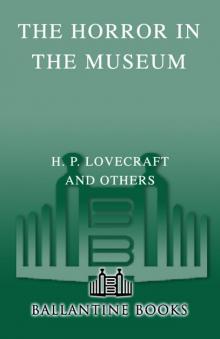 The Horror in the Museum
The Horror in the Museum Collected Fiction Volume 1 (1905-1925): A Variorum Edition
Collected Fiction Volume 1 (1905-1925): A Variorum Edition Lovecrafts_Fiction, vol.I_1905-1925
Lovecrafts_Fiction, vol.I_1905-1925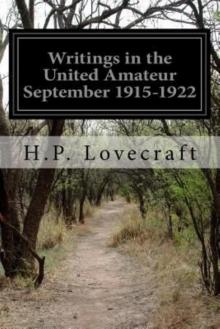 Writings in the United Amateur, 1915-1922
Writings in the United Amateur, 1915-1922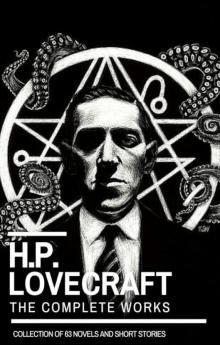 H.P. Lovecraft: The Complete Works
H.P. Lovecraft: The Complete Works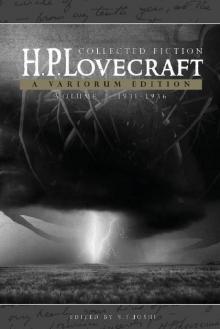 Collected Fiction Volume 3 (1931-1936): A Variorum Edition
Collected Fiction Volume 3 (1931-1936): A Variorum Edition H.P. Lovecraft: The Complete Fiction
H.P. Lovecraft: The Complete Fiction Collected Fiction Volume 2 (1926-1930): A Variorum Edition
Collected Fiction Volume 2 (1926-1930): A Variorum Edition Yog Sothothery - The Definitive H.P. Lovecraft Anthology
Yog Sothothery - The Definitive H.P. Lovecraft Anthology The Complete H.P. Lovecraft Collection (Xist Classics)
The Complete H.P. Lovecraft Collection (Xist Classics)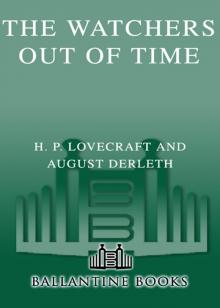 The Watchers Out of Time
The Watchers Out of Time Eldritch Tales
Eldritch Tales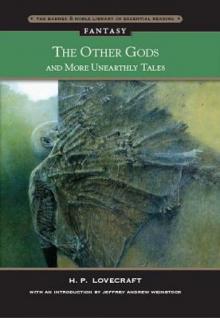 The Other Gods And More Unearthly Tales
The Other Gods And More Unearthly Tales The New Annotated H. P. Lovecraft
The New Annotated H. P. Lovecraft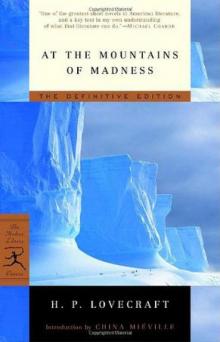 At the mountains of madness
At the mountains of madness Bloodcurdling Tales of Horror and the Macabre
Bloodcurdling Tales of Horror and the Macabre Fossil Lake II: The Refossiling
Fossil Lake II: The Refossiling Shadows of Carcosa: Tales of Cosmic Horror by Lovecraft, Chambers, Machen, Poe, and Other Masters of the Weird
Shadows of Carcosa: Tales of Cosmic Horror by Lovecraft, Chambers, Machen, Poe, and Other Masters of the Weird H. P. Lovecraft
H. P. Lovecraft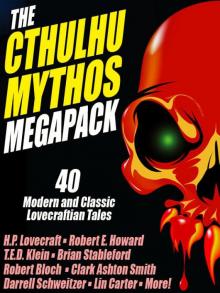 The Cthulhu Mythos Megapack
The Cthulhu Mythos Megapack The Complete H. P. Lovecraft Reader (2nd Edition)
The Complete H. P. Lovecraft Reader (2nd Edition) The Complete Fiction
The Complete Fiction Waking Up Screaming
Waking Up Screaming Transition of H. P. Lovecraft
Transition of H. P. Lovecraft![[1935] The Shadow Out of Time Read online](http://i1.bookreadfree.com/i2/04/12/1935_the_shadow_out_of_time_preview.jpg) [1935] The Shadow Out of Time
[1935] The Shadow Out of Time The Horror Megapack
The Horror Megapack